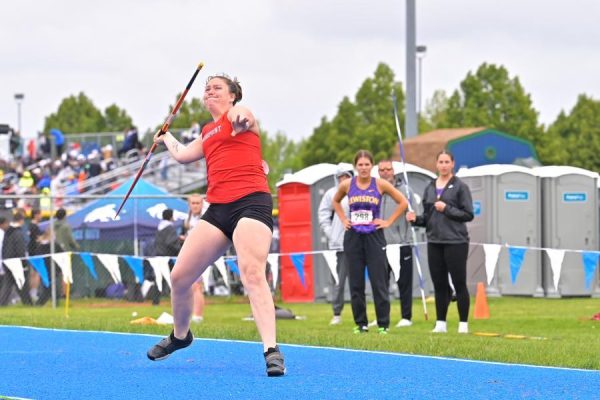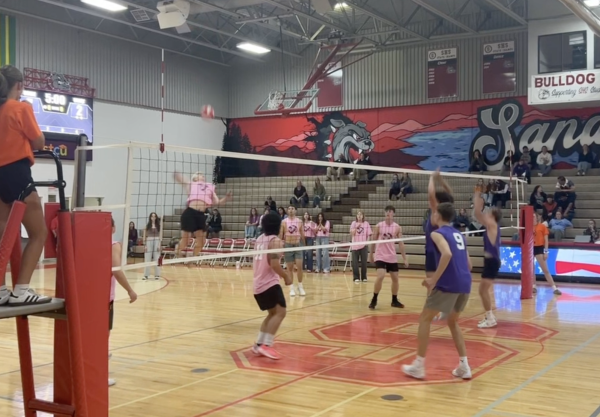EARNING THEIR STRIPES
High School referees address the struggles of being an official
While fans may come to know athletes on a team by number and name, they often only know the referee by face, if at all. These men and women choose to support high school sports for a smattering of reasons, and a common one is a deep passion for the game.
Alecia Koski, a volleyball referee from Post Falls, became certified because she wanted to stay involved with the sport she loves after both her and her daughter stopped playing.
“I really enjoy just the atmosphere of volleyball, and watching the girls play and bettering them and bettering myself as an official,” Koski said.
She now refs two to three nights a week, along with another job she has in Post Falls.
Koski, like many other referees in the area, often commutes to ref at different schools, but she really likes reffing at Sandpoint High School.
“The kids, the coaching staff, the administration and then the supporters [at SHS] are really great,” Koski said.
Others, such as Sandpoint local and soccer official Jason Hauck, ref because their child plays the sport and they want to be connected to the community of that sport on a different level than they would be as a spectator.
Hauck’s son, junior Curtis Hauck, likes that his dad refs, and feels a sense of security when he is on the reffing crew for his soccer games.
“When he refs my games, for me, it is like having any other ref, because I know he won’t be biased towards me,” Curtis Hauck said. “However, I do feel more safe because having my parent ref helps me in realizing that the refs are trying to keep every player safe.”
Jason Hauck refs often during the fall and spring, and like others, works a regular job as an insurance agent during the day.
“Watching kids progress in their careers is rewarding,” Jason Hauck said. “Watching teenagers gain maturity and make better decisions, improve their skills, and grow as people is fun.”
Football referee Danny Brum also refs to stay in the game, after he played college football. Brum sometimes refs four times a week at high schools in the area, while also working a day job at a warehouse in Coeur d’ Alene.
“My favorite part is definitely the morale,” Brum said. “We have a really great crew and we like to hang out after games, and watch other games together.”
Collectively, these SHS referees agreed that one of the best, yet the hardest parts of reffing is the intense, nail-biting games, and knowing that they could be a main factor in the outcome. The close competition of these games entails more focus, precision and much less room for error.
“I’m probably harder on myself than anybody else in the room because I’m afraid of making mistakes, and in a close match that’s kind of scary,” volleyball ref Brenda Haase of Clark Fork said. “You don’t want to find a match going one way or the other because of errors.”
All of these SHS refs seem to be called to duty often, because of the major shortage of officials in the area.
Idaho and many other states throughout the nation are struggling with this problem.
There are numerous reasons for this, such as the time commitment it takes, the wages of a high school referee, and the lack of new officials, while many of the current ones are reaching retirement ages.
“The number of people who want to give their time, money and put the effort in to become good at it is limited,” Jason Hauck said.
The lack of officials has especially affected SHS teams this fall, causing game cancellations and “lack of quality” in referees, according to Curtis Hauck.
Each year the number of high school referees decreases, while the number of high school athletes increases.
According to the National Federation of State High School Associations, only two of every 10 officials return for their third year of officiating, while high school athletes have doubled in number.
Another major cause for this shortage may lie not within the job itself but within the actions, and behaviors of students, athletes, coaches and parents.
Very often referees are scrutinized for the calls they make, which can take a toll and make them wonder if it is worth it.
“Parents and coaches who verbally abuse referees think only of themselves and don’t consider the motives that drive those of us who do this,” Jason Hauck said. “The pressure to be perfect is high and the abuse taken is a big cause for newer officials to quit.”

Jezza Hutto is a senior and it is her second year on staff. Here are some fun facts about Jezza.
What are you freakishly good at?
I'm freakishly...





